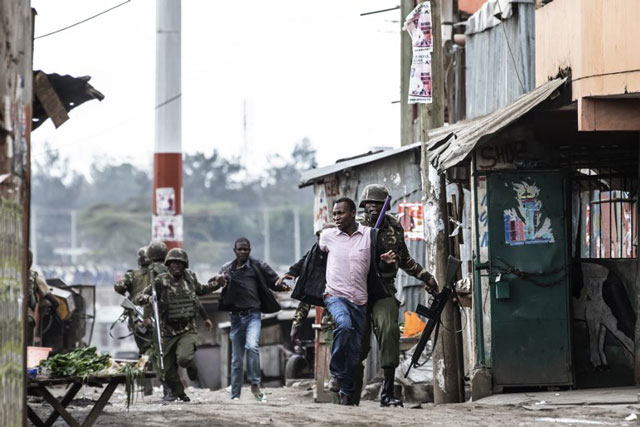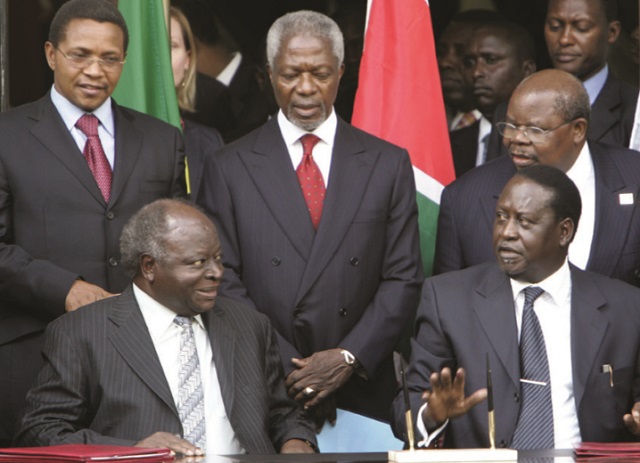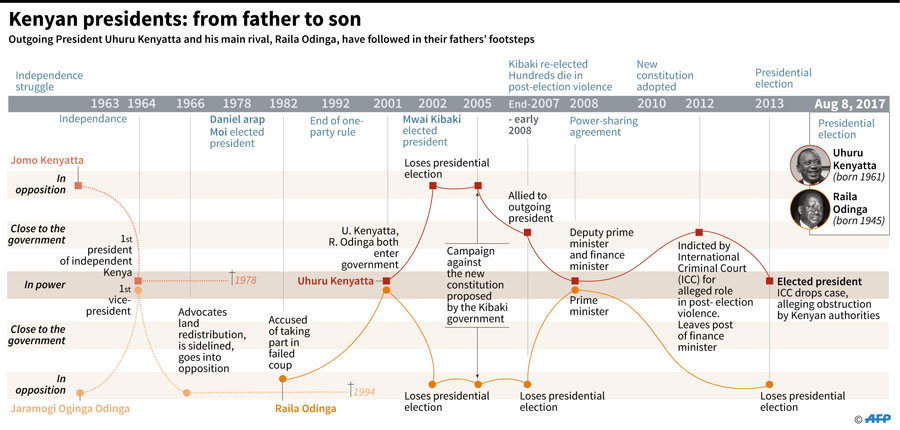
Nairobi, Kenya | AFP | Though it is seen as the most democratic country in east Africa, Kenya is on a knife-edge because its opposition coalition is claiming election results are being rigged.

Nairobi, Kenya | AFP | Though it is seen as the most democratic country in east Africa, Kenya is on a knife-edge because its opposition coalition is claiming election results are being rigged.
Partial results from Tuesday’s general election released by the electoral commission (IEBC) show President Uhuru Kenyatta with a solid lead over his main opponent Raila Odinga, but Odinga claims those numbers are fake.
The stakes are high for Kenya: the country is an African powerhouse in the making but it is struggling to keep its deeply polarised political landscape from rupturing.
– Why are Kenyans so nervous? –
Because they have been here before.
Odinga has stood for president three times before. He placed third in 1997, and in both 2007 and 2013 he cried foul.
The 2007 vote is notorious because international observers agree it was probably rigged. Shortly after the disputed polls, violence broke out nationwide, leaving 1,100 people dead and 600,000 displaced.
Ethnic identity is strong in Kenya and the country’s different peoples turned on each other as the fighting stretched into 2008.
Elections in 2013 ended largely peacefully as Odinga took his grievances to court.
However, the divisions from those clashes remain in Kenyan society today, and many Kenyans fear they could erupt again if Odinga’s fraud claims are not resolved.
– What are the opposition’s complaints?
Odinga believes that partial election results the IEBC is posting on a public website are fabricated.
His National Super Alliance (NASA) coalition alleges that hackers have breached the IEBC’s electronic voting systems and falsified the public data.
What’s more, they say the hackers used the login credentials of Chris Msando, a top IT official with IEBC who who was tortured and murdered in late July.
His killing remains unsolved, but speculation abounds in Kenya that he was done in by someone who wanted to use his knowledge of the IEBC to tamper with the vote.
Odinga has provided documents allegedly showing a database being manipulated, as well as documents purported to be from the IEBC server showing him to be the true winner.
The IEBC has denied Odinga’s claims — notably because his documents appear to come from a Microsoft database while their system runs on Oracle.

– How are votes being counted? –
It’s complicated, and the country is abuzz with talk about “Form 34A” and “Form 34B” — seen as crucial to verify the electronic results Odinga is disputing.
Votes were counted in each of the 40,883 polling stations and the results entered onto a Form 34A, signed by agents from all parties and election officials.
These results were then typed into a tablet and sent to the IEBC in Nairobi before going on to a public website.
The Form 34A is meant to be authenticated via photograph, but it has taken time to upload these, further stoking tensions.
All these forms are then sent to regional collation centres, where they are added together with other results on a Form 34B.
That is then sent on to Nairobi. It is only after all form 34Bs are tallied and validated that presidential results are announced.
– How are Kenyans reacting? –
Most aren’t reacting at all. If anything, the country is abnormally quiet. Nairobi and other Kenyan cities are usually bustling and packed with traffic.
All that has died down since Tuesday, the day of the vote, which was a public holiday.
Protests have been isolated in Odinga strongholds in Nairobi slums, and the western city of Kisumu.
Two protesters were shot dead in the Mathare slum by police who claimed they attacked them with machetes. Another two people were gunned down by police when they allegedly attacked a polling station. A polling worker who was stabbed in that attack also died.

– Where does Kenya go from here? –
Up, hopefully.
The economy is one of the largest in east Africa, and has grown at more than five percent every year since 2013.
Whoever becomes president will be in charge of a country that is positioning itself to be a major African player.
But first, Kenya will have to get through a predicted slowdown in growth over the next year, said Nic Cheeseman, a professor of African politics at Britain’s University of Birmingham.
He predicts that a spike in food prices, which became a major issue on the campaign trail, will not end quickly.
And even if the vote dispute ends calmly, Cheeseman said it has already raised questions about the country’s stability.
“It’s not going to be something that keeps the country down forever,” Cheeseman said of the troubled election. “But, obviously, everything that happens like that is bad news for the country.”
Tags history Kenya kenyatta Odinga politics Uhuru vote